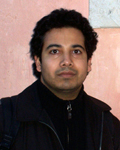2007, 2008
Kushanava Choudhury
- Doctoral Candidate
- Yale University

Abstract
This dissertation elaborates on Hannah Arendt's observation that a feature of modern states is to make groups of its own citizens superfluous. Superfluous people are those who fall outside a state's concept of a social, economic, or political order. Such people are often victims of coercion not because they are targeted by the state, but because they are in the way of state plans (such as urban development, dam building, etc). This project investigates how various types of states in different historical periods have rendered parts of their own citizenry superflous. Second, it follows how the state treats people who have been so deemed. This dissertation combines political philosophy and empirical social science to investigate modern forms of power and powerlessness.
Abstract
In the modern world, the city of Calcutta is a symbol of Third World squalor. This project argues that Calcutta—a British-built metropolis of 14 million—offers a unique vantage point from which to observe the modern experience. The shock of Calcutta is not its poverty, but that poverty is everywhere, uncontained and visible. Calcutta lays bare relations of power and powerlessness unlike any modern metropolis. This study of Calcutta reveals the nature of modernity from a specific place and contributes to theoretical debates about modernization and globalization.

